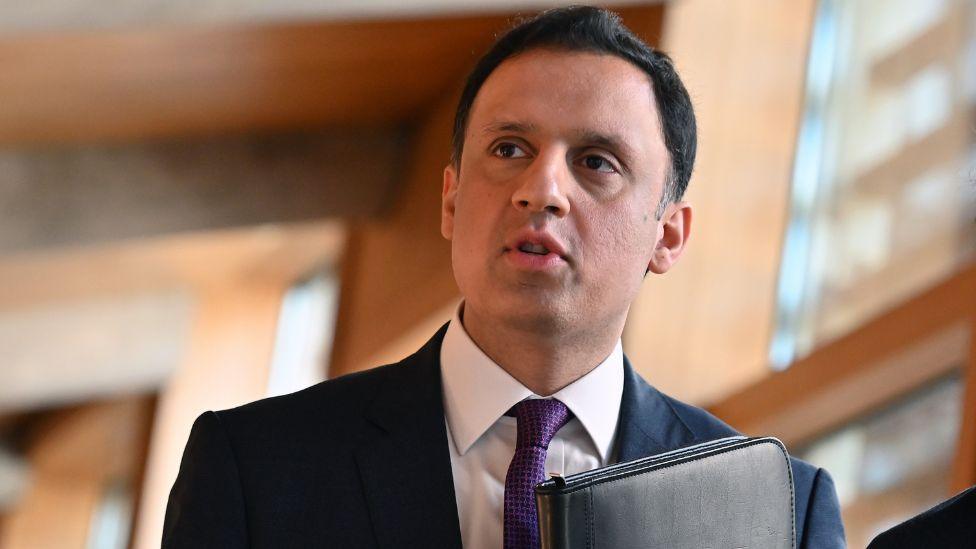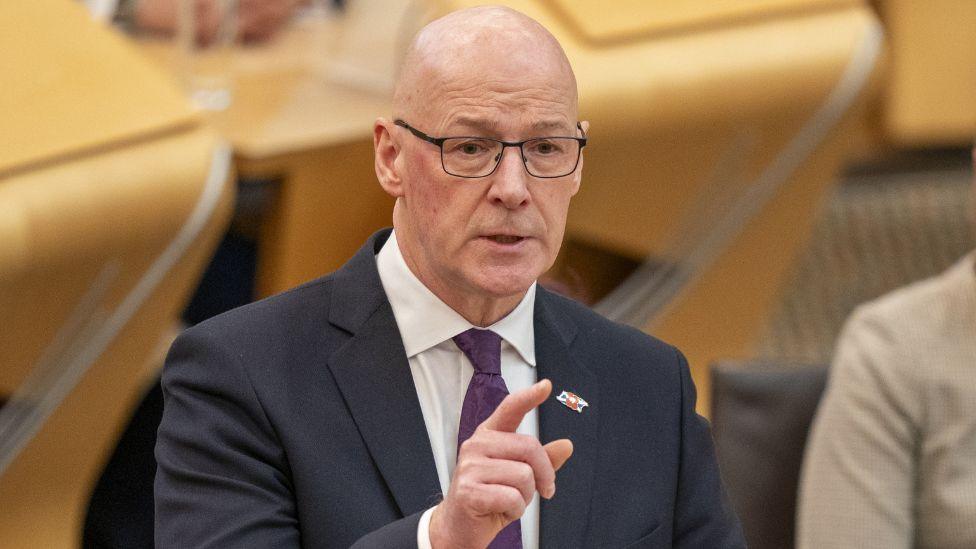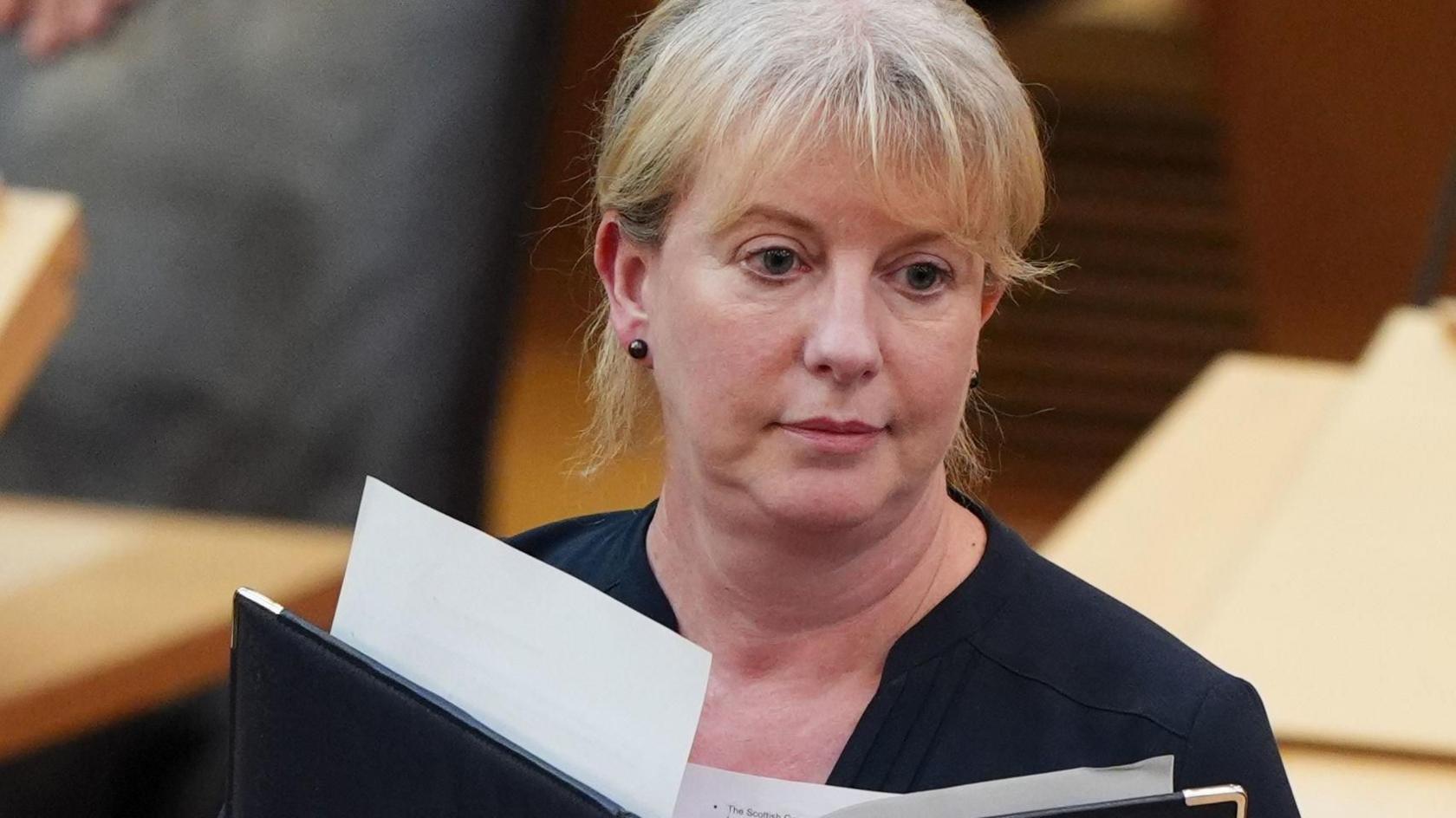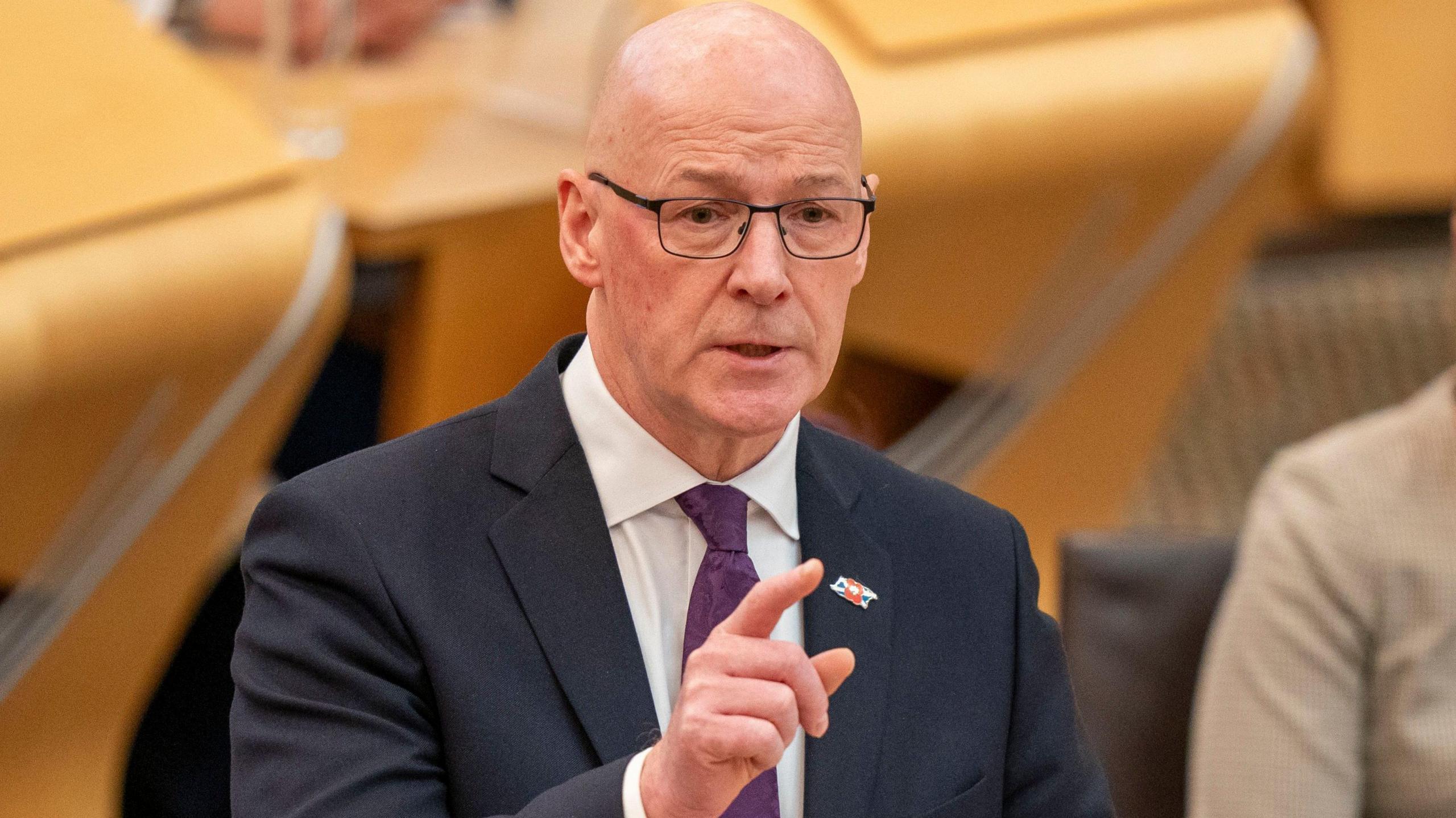Muscatelli report: What will it take to grow Scotland's economy?

Anton Muscatelli is the former principal of the University of Glasgow
- Published
Scots needs to focus on economic growth and becoming more productive if they're to see enhanced prosperity and a flow of tax funds to boost public services.
That's the view across most of the political spectrum, and of economists such as Sir Anton Muscatelli, former principal of the University of Glasgow.
It's uncontroversial, until you ask how to make it happen.
Sir Anton was set that task in February. The request came from Anas Sarwar, leader of Scottish Labour, who had a particular interest in the way the economy in some of Scotland's regions has under-performed.
Nine months later, and no longer in residence at Glasgow University, Sir Anton has provided some answers.
They won't be comfortable reading for Scotland's SNP government, whose ministers used to consult the professor as a member of their Council of Economic Advisers.
The report's author emphasises that he's studied the issue independent of party.
For Scottish Labour, this raises some awkward choices as well, notably around income tax.
Why did Scottish Labour commission this report?

Anas Sarwar had an interest in how the economy under-performed in some regions
It seems that Anas Sarwar saw the potential to focus the campaign on regions. Even before the report was published, he was saying he wants to push decision-making down to local and regional "communities".
Note that the promise doesn't mention councils.
He claimed Holyrood has become an economics-free zone, and that the SNP government is "Edinburgh-centric".
This seems intended to position Labour as pro-growth and pro-business, which is not where the party was heading under Mr Sarwar's predecessors.
It also seeks to contrast Labour with the "National" in the Scottish National Party.
He paints the SNP as the party of the Holyrood bubble, while Labour wants to be seen as speaking for those outside.
In the US, politics is seen as happening "inside the Beltway" around Washington. In London, there's another world perceived "beyond the M25" circular.
Now, Anas Sarwar has set a new defining line in Scottish politics as the A720 ring road, from the roundabouts at Old Craighall to Sheriffhall and Gogar.
What does the report say about growth in Scotland?

The SNP would suggest Holyrood needs more powers to promote growth
It's not flattering. The first sentence sets out the urgent "need for much greater consistency, clarity of purpose, and sustained focus".
The point is made that public services depend on growth across the economy to generate tax revenue.
Growth and productivity have been sluggish at UK level as well. But Sir Anton points out that Scotland's growth rate has diminished the tax base relative to its nearest neighbours.
If Scottish growth had matched UK levels, he says Holyrood could have had £1bn more to spend each year.
The report's author contrasts the approach of the Westminster Government under Labour with that of the SNP. The former has a 'modern industrial strategy' and a mission for growth. The latter is seen as "piecemeal", having been "deprioritised".
The urgency of tackling slow growth in Scotland is clearer in some of its regions, says the report.
In stark contrast to the Edinburgh city region, some other areas are dropping in productivity levels and are now lagging comparable places in the rest of the UK. That means regional inequalities have become worse.
One response to this - the one you're likely to hear from the SNP - is to say Holyrood needs more of the powers necessary to promote growth, such as competition policy, business taxation and tax incentives for research and development.
However, Sir Anton says the key to success in other developed countries where such powers are held at different levels of government is to use the levers you have to complement those you don't have.
What is the report recommending?

The economy in north-west England is growing faster than Glasgow
"Taking the brakes off", says Sir Anton. Whoever is in St Andrew's House after next May is told they need to prioritise growth, starting with a committee chaired by the First Minister, which is focussed on growth.
He wants to see "deep devolution" to local leaders, as promised in England.
In short, England is going through a form of devolution which could be seen as catch-up with Scotland's powers over the past 26 years. English change may put it at an advantage if more local control produces better economic results.
Hearing from business leaders, Sir Anton heard that city metropolitan areas such as Manchester have already "seemed more co-ordinated than their Scottish counterparts", with more flexible deployment of funding.
Comparing Manchester city region with Glasgow's, he observes that growth and productivity per worker have risen at similar levels, but the economy in north-west England is growing faster because it is attracting more migrants, workers and investment.
The report goes into detail on university policy, as you might expect a former university principal to do, because universities are drivers of business and employment growth.
We're told planners need to be more flexible, and housebuilding should be more ambitious across all types of home.
New approaches are required to boost Scottish trade and investment (where Scotland already does better than most English regions) and to target business rates relief, creating incentives for growth.
Having seen the impact of restricted immigration visas for student recruitment, Sir Anton is alert to the demographic problems afflicting Scotland's economic growth. So he's calling on the UK Government to work with the Scottish one on exemptions and incentives to move to Scotland.
In addition to being told to ease its tough messages on immigration, and to reduce energy costs for business, Labour is told to avoid further divergence on income tax if it wins power at Holyrood next May.
"An incoming government should consider and actively report to Parliament on the economic growth effects which arise from divergence or alignment of Scottish and UK tax bands".
What could this mean for local and regional Scotland?

Councils are calling for a reset of budgets and their autonomy
Local councils are seen as limited in their ability to support growth, with cuts to economic development budgets and their ability to support small firms.
Across parties, councillors agree. They're calling for a reset of budgets and of their autonomy.
Enterprise agencies are portrayed as being constrained by their reduced levels of funding.
Again, there are lessons from England. The funding flexibility an English mayor has is less than the options open to Holyrood's finance secretary, but greater than the room for manoeuvre of Scottish city leaders.
Is this a lesson that Scotland needs to have directly-elected mayors, perhaps called provosts?
Sir Anton Muscatelli is not giving an answer to that question, but he's clearly attracted by the devolution of power to regional economic partnerships of councils, agencies and local business.
"Scotland's larger cities should be able to access the level of policy flexibility and power available elswehere in the UK, devolving beyond Holyrood," he writes.
"And both (Westminster and Holyrood) governments should articulate what will come after city (and regional) growth deals."
That's without forgetting towns at risk of being left behind by city growth hubs, and the need for a different growth programme in rural Scotland.
How has the SNP responded?

John Swinney has made economic growth a higher priority than his predecessors
As the party of Scottish Government, the answer is to say that the SNP is fully in favour of improved economic growth. John Swinney has made it a higher priority than his predecessors Nicola Sturgeon and Humza Yousaf.
It is pointed out that the Programme for Government this year has already set out to create regional economic partnerships.
As a party of opposition to Labour, however, there's a more robust response - attacking the party of Westminster Government for heading towards broken manifesto promise with income tax increases outside Scotland (neither confirmed nor denied ahead of Rachel Reeves' budget).
If these go ahead, they would have the effect of leaving a large gap in the Holyrood budget, with one academic's estimate putting it around £1 billion.
Neither voice from the SNP has sought to attack Sir Anton Muscatelli. He's been an economic adviser to SNP ministers, and he may be again.
A careful reading of his report may even prove helpful to the SNP, as well as Labour and other parties bidding for power at next May's election. It avoids any discussion of the independence powers that the SNP would prefer to be discussing.
But without such powers, it helps to understand the challenge of low economic growth, with some interesting ideas for tackling it.
Related topics
- Published4 days ago

- Published6 November

- Published25 September
